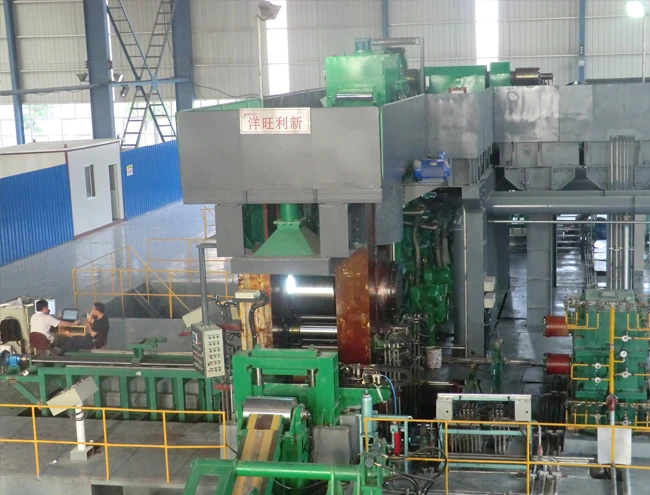
Cladding Rolling Mill: Advanced Metal Bonding Technology&Energy-Efficient Manufacturing Solutions
Cladding Rolling Mill has emerged as a transformative solution in the manufacturing industry, offering superior surface quality, energy efficiency, and cost-effectiveness. Developed by Beijing Yang Wang Li Xin Sci&Tech Co., Ltd. (formerly Shijiazhuang Yangwang Electromechanical Technology Co., Ltd), this technology addresses the limitations of traditional methods like hot roll bonding cladding and explosive cladding. This article explores the technical features, applications, product specifications, and company background of the Cladding Rolling Mill, while incorporating authoritative insights from the National Institute of Standards and Technology (NIST) to validate its significance in modern industrial practices.
Technical Features of Cladding Rolling Mill
The Cladding Rolling Mill employs a cold rolling process to produce clad metal strips with exceptional surface quality. Unlike traditional methods, this technology eliminates the need for acid pickling treatment after rolling, as the cold rolling process prevents oxide adhesion on the strip's surface. This results in a smooth, defect-free finish that meets the stringent requirements of industries such as electronics, automotive, and chemical processing.
One of the most notable advantages of the Cladding Rolling Mill is its energy conservation and environmental protection capabilities. By avoiding the reheating of metal strips before rolling and eliminating acid pickling after rolling, the process significantly reduces energy consumption and minimizes hazardous waste. This aligns with global initiatives to promote sustainable manufacturing and green technology, as emphasized by NIST in its guidelines on industrial energy efficiency (NIST).
The simplified rolling process of the Cladding Rolling Mill involves three main stages: surface treatment before rolling, bonding rolling, and annealing treatment. This streamlined approach ensures a high yield rate (above 90%) while reducing production costs and capital investment. The system is designed to produce bimetallic or tri-metallic cladding in a single production line, offering flexibility for diverse applications.

Applications of Cladding Rolling Mill
The versatility of the Cladding Rolling Mill makes it suitable for a wide range of industries. Clad metal strips produced by this technology are increasingly replacing non-ferrous materials and stainless steel in applications such as electronic components, decorative materials, chemical equipment, and automotive parts. For example, copper-steel and aluminum-steel cladding strips are used in heat exchangers and electrical conductors, while stainless steel-steel cladding is employed in corrosion-resistant vessels.
The ability to produce ultra-thin cladding coils (with a minimum thickness of 0.2mm) and wide strips (up to 1000mm) further expands the technology's applicability. In the automotive industry, these strips are used for lightweight structural components, while in chemical processing, they provide high durability and resistance to harsh environments. The cold rolling process also ensures consistent material properties, making the final products ideal for precision engineering.
Product Specifications
| Feature | Specification |
|---|---|
| Rolling Process | Cold Rolling |
| Surface Quality | Free from Oxides and Defects |
| Energy Efficiency | Reduces Reheating and Acid Pickling |
| Yield Rate | Over 90% |
| Production Flexibility | Supports Bimetallic and Tri-metallic Cladding |
| Cladding Materials | Copper, Aluminum, Stainless Steel, and Steel |
| Maximum Strip Width | 1000mm |
| Minimum Thickness | 0.2mm |
Company Background: Beijing Yang Wang Li Xin Sci&Tech Co., Ltd.
Beijing Yang Wang Li Xin Sci&Tech Co., Ltd. (formerly Shijiazhuang Yangwang Electromechanical Technology Co., Ltd.) is a leading innovator in metal cladding technology. The company has developed cold rolling cladding technology, processes, and complete equipment that address the limitations of traditional methods. Their expertise spans copper-steel, aluminum-steel, copper-aluminum, aluminum-stainless steel, and stainless steel-steel cladding, enabling the production of multi-layered metal composites in a single production line.
The company's commitment to technological advancement and sustainability is evident in its independent R&D efforts. By integrating global best practices with localized manufacturing solutions, Beijing Yang Wang Li Xin Sci&Tech Co., Ltd. has positioned itself as a key player in the metal cladding industry. Their products are widely used in electronic, automotive, and chemical sectors, where high-performance materials are critical.

Why Choose Cladding Rolling Mill?
The Cladding Rolling Mill offers a cost-effective and eco-friendly alternative to traditional hot roll bonding cladding and explosive cladding. Its cold rolling process eliminates the need for high-temperature treatments, reducing energy consumption and operational costs. Additionally, the high yield rate and simplified production make it an attractive option for manufacturers seeking scalable solutions.
For industries that prioritize sustainability, the Cladding Rolling Mill aligns with global environmental standards. By minimizing waste generation and energy use, it supports the circular economy and green manufacturing goals. This is particularly relevant in light of NIST's research on industrial energy efficiency and sustainable practices (NIST).
Conclusion
The Cladding Rolling Mill represents a significant advancement in metal cladding technology, offering superior surface quality, energy efficiency, and cost-effectiveness. Developed by Beijing Yang Wang Li Xin Sci&Tech Co., Ltd., this technology addresses the limitations of traditional methods while meeting the demands of modern industries. Its versatile applications and eco-friendly process make it a preferred choice for manufacturers seeking innovative solutions.
For more information about the Cladding Rolling Mill and its applications, visit the official website of Beijing Yang Wang Li Xin Sci&Tech Co., Ltd. at https://www.bjywlx.com/cladding-rolling-mill.html.
References
NIST (National Institute of Standards and Technology). (2025). https://www.nist.gov. Retrieved from NIST Official Website.
-
YWLX’s 1450mm Six-Hi Reversing Mill Goes Live in BangladeshNewsNov.24,2025
-
Adjusting Roll Gap in 6Hi Reversing Cold Rolling Mill for Thin StripNewsNov.13,2025
-
Quality Control Standards for Automatic Gauge Control in Strip RollingNewsNov.13,2025
-
Effect of Skin Pass Rolling on Metal DuctilityNewsNov.13,2025
-
Key Components of a Modern TempermillNewsNov.13,2025
-
Common Wear Patterns of Work Roll in Tandem Cold Mill OperationsNewsNov.13,2025
-
Revolutionary Skin Pass Rolling Technology for Enhanced Steel QualityNewsNov.04,2025










